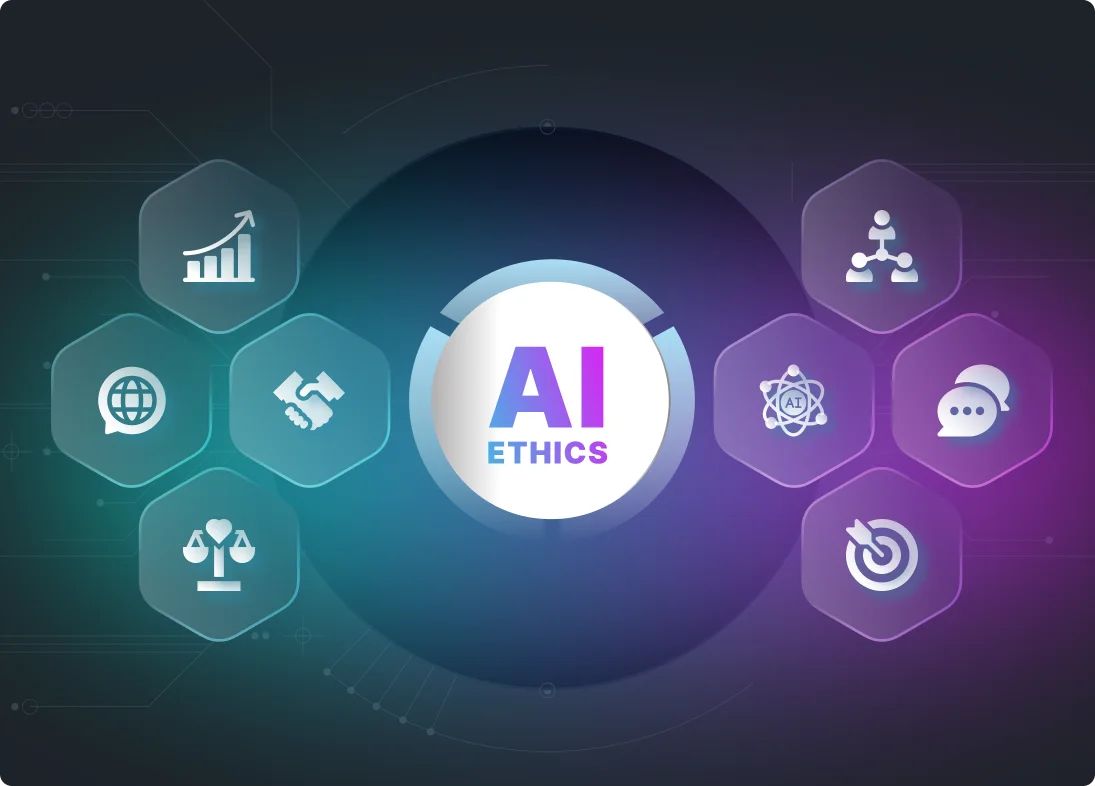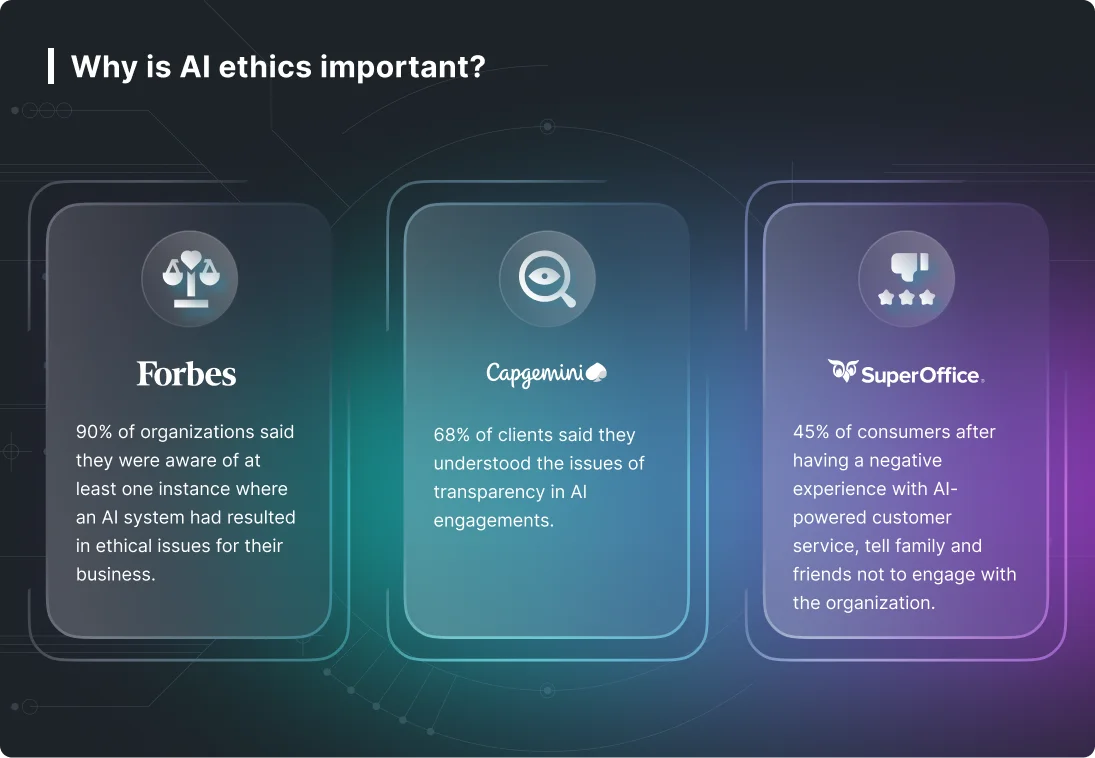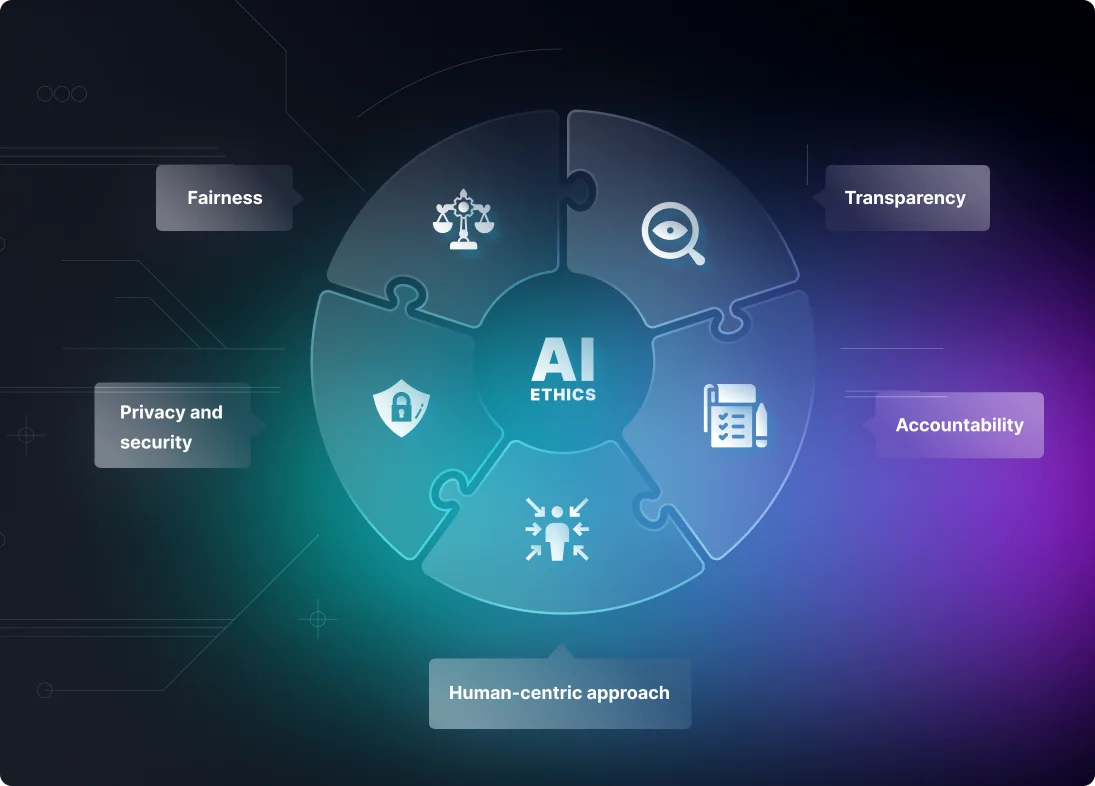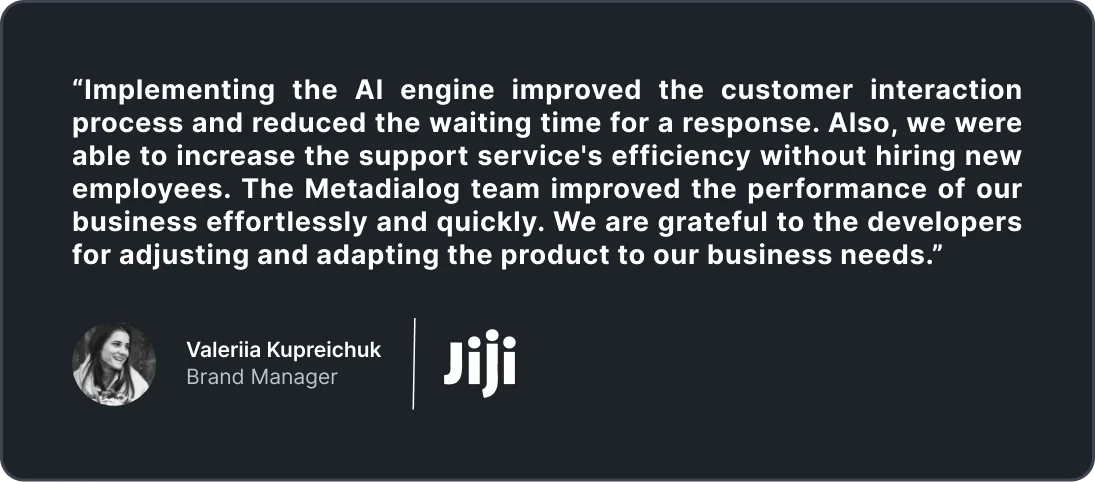With the swift rise of artificial intelligence, society is growing increasingly concerned about the potential dangers of these machines. Cult movies like Terminator and Matrix vividly describe the risks posed by artificial intelligence. The scale at which AI brings concerns can vary and be different, depending on how and where machine intelligence is applied.
Many people are worried about the impact and potential threats that machines bring. Among them are Elon Musk and Bill Gates, who are apprehensive about the alarming potential that high tech presents. Thus, there is a critical field of study – the ethics of AI. This field ensures the safety and correct utilization of computer intelligence technologies.
In this article, we are going to explore the core of AI ethics, focus on its importance and discuss how it impacts the development of algorithms today.
What is AI ethics?
AI ethics is a set of moral principles which ensures that AI technologies are aligned with human values, rights, and societal norms. These principles integrated into its CPU system help it guide the development of computer intelligence technologies and take care of the ethical part of it.
The ethics of AI concept governs the behavior of AI engines developed to interact with humans. It directly influences how the machine makes fundamental conclusions and finds out the effect of these decisions on the people it interacts with. AI ethics has larger cultural, political, and economic consequences and goes beyond merely being a technical issue. It can be compared to a critical lens through which we observe the influence of machine intelligence on society.

Another field of study in this area is the ethics of conversational AI. Here, developers establish regulations that the AI smart bot or voice assistant utilizes to build the structure and limitations of the client conversation. As the integration of conversational bots becomes mainstream, delivering an appropriate consumer experience is vital.
Moreover, such an experience must be flawless in morality and tolerance. To give an example, the smart bot in financial institutions must be programmed to provide unbiased advice, irrespective of the client’s gender, ethnicity, or socioeconomic status. If the AI gives inaccurate or preferential suggestions based on the user’s identity, it will undoubtedly lead to ethical complications and erode the client’s trust.
Beyond that, numerous questions need to be resolved regarding how the chatbot should act on certain issues, such as:
- Should chatbots disclose their non-human identity?
- What measures help to ensure the privacy and security of user data?
- How can we prevent these systems from spreading misinformation?
Ethical implications of artificial intelligence
The choices we make and the conversations we have with the chatbot influence future artificial intelligence decision-making, thanks to the self-learning capabilities that the bot possesses. That’s why it’s so critical to consider potential risks that could perpetuate biases, threaten privacy, or even influence how people make choices. The ethics of AI help mitigate these risks while simultaneously maximizing the benefits that automated assistants bring to businesses.
To implement ethics in AI, organizations need to establish ethical guidelines for artificial intelligence development. They should incorporate processes to evaluate and audit AI systems for ethical concerns, such as biases or privacy infringements. Moreover, organizations should promote awareness of ethical culture within the company, especially among the developers who build these technologies.
There are many ethical implications of AI. They address a number of crucial topics, including responsibility, justice, openness, and privacy. In order to appropriately employ advanced technology, it is important to comprehend these challenges.
AI ethics imply the moral application of computer automation, while ethical AI principles guide the creation and use of AI systems. These concepts often involve human-centered design, accountability, and openness. They serve as a guide to making sure AI technology takes into account social norms, values, and human rights.
AI systems, including chatbots, should be designed and used responsibly. They should respect user privacy and consent, and their algorithms should be auditable. By adhering to these ethical principles, we ensure AI tools enhance customer experience without compromising ethical standards.
Ethics of AI is a vital field which helps us navigate the complex ethical landscape of artificial intelligence. Enterprises and organizations worldwide continue to integrate machine optimization into business processes as it’s become more crucial than ever.
Ethical considerations in conversational AI
Understanding the various subcategories associated with ethics artificial intelligence is crucial. In particular, one aspect that deserves meticulous attention is the ethics of conversational AI, especially as chatbots become an integral part of our digital interactions.
Ethic’s influence on AI
Conversational AI, like chatbots, has dramatically transformed how businesses engage with their clients. However, their increased utilization brings forth critical ethical issues. These include concerns about fairness and bias AI responses, which require careful ongoing monitoring. Furthermore, there’s the matter of privacy, as it’s essential to protect user data and maintain confidentiality when AI systems handle sensitive information.
What steps can we take to ensure AI systems, such as chatbots, produce unbiased and fair responses? How can we implement robust measures to maintain privacy and safeguard the confidentiality of data?
The ethics of chatbots bring forth several questions, particularly regarding the need for robust ethical guidelines that govern the behavior of conversational AI. It emphasizes the importance of responsibility, openness, and justice. The use of such technologies guarantees a secure and civil online environment.
AI in customer experience
AI is revolutionizing the customer experience in unprecedented ways. From personalized product recommendations to 24/7 customer service through chatbots, It has elevated the standards of customer engagement. When businesses leverage AI to enhance customer experience, they must always consider ethical aspects.
Respecting customers’ data privacy, maintaining transparency in AI-powered interactions, and ensuring non-discriminatory practices are essential to ethical artificial intelligence deployment in customer service. Therefore, understanding and integrating the ethics of conversational AI is a moral obligation and a strategic necessity to businesses today.
The importance of AI ethics
It’s essential to understand why is AI ethics important. It extends beyond mere compliance with regulations. It plays a vital role in shaping trustable and sustainable AI systems.
AI ethics is a proactive approach to prevent the misuse of intelligent technologies and mitigate their potential harms. Artificial intelligence ethical violations lead to discriminatory behaviors, privacy violations, or even the abuse of personal data, which damage a company’s image and have legal repercussions.

Ignoring ethics leads to biased AI systems, further propagating societal prejudices and discrimination. They inadvertently create unfair outcomes, especially in high-stake domains such as hiring, lending, or healthcare, which rely heavily on computers’ decision-making.
Whether it’s the ethics of conversational AI or the broader ethics of AI, implementing it is no longer optional. It’s a business imperative to harness the power of artificial intelligence responsibly. Such a situation helps in risk mitigation and also strengthens trust with stakeholders, and solidifies brand reputation in the long run.
Basic steps for implementing ethics in AI
Adopting AI technologies becomes an urgent priority to develop businesses. By weaving ethical considerations into the fabric of machine development and deployment, companies ensure they use artificial intelligence responsibly, enhancing customer trust, brand reputation, and regulatory compliance.
- The first step towards implementing ethics in AI is to develop a clear set of ethical AI principles. They often concentrate on fairness, accountability, transparency, and respect human rights.
- Secondly, businesses must establish ethics review processes which scrutinize AI systems for different concerns such as biases, privacy breaches, or lack of transparency. Regular audits and reviews help identify potential issues early, allowing timely remediation.
- Furthermore, promoting an ethical AI culture inside the company is critical. This means teaching AI developers and users why ethics matter. We must also give them the tools and resources to include it in their work.
There are several examples of successful companies that implement ethics principles into artificial intelligence. As an instance, IBM has established a specific office to watch the rules upon which AI acts and released its AI ethics guidelines, emphasizing fairness and transparency. Similarly, Google’s Bard principles outline its commitment to ensure the technology is socially beneficial and avoid creating unfair biases.
How does ethics impacts artificial intelligence
The widespread adoption of AI has given rise to many ethical implications of artificial intelligence. They range from privacy concerns to issues of accountability and fairness, and they demand a robust ethical framework to ensure the responsible use of AI. They include problems of responsibility, justice, privacy concerns, and a call for solid frameworks. All of that guarantees the appropriate use of artificial intelligence and keeps personal data safe.
On the positive side, AI potentially drives societal benefits. It enhances efficiency, enables personalized experiences, and even addresses complex societal challenges like climate change or disease diagnosis. But as always, with certain benefits come even bigger risks and challenges.
One major ethical concern is privacy. Artificial intelligence systems often work with large amounts of data. Its main sphere of action is data collection, storage, and use. Another key issue is the potential for AI to perpetuate or even amplify existing biases, leading to unfair outcomes. There’s also the question of accountability – who is responsible for the AI system’s decisions?
Principles of ethical AI
Navigating the complex terrain of AI ethics is made simpler by adhering to well-defined Ethical AI principles. These principles serve as the guiding beacons, shaping how artificial intelligence is developed, deployed, and managed in alignment with moral standards.
- Fairness
Fairness is one of the cardinal principles of ethical AI, which requires these systems to make unbiased decisions. Avoiding and mitigating biases in AI models is essential to prevent outcomes disadvantageous to certain groups. - Transparency
AI systems should be transparent, providing users with understandable explanations of how they operate and make decisions. The “explainability” of AI systems is crucial to building trust and responsibility. - Privacy and security
AI systems must respect users’ privacy and ensure the highest level of data security. Such a principle is key to ensuring robust data governance, anonymizing personal data, and informing users about their data usage. - Accountability
There should be mechanisms in place to hold entities accountable for the outcomes produced by AI systems. Accountability is made up of organizations, users, and developers. - Human-centric approach
The interests of individuals and society should always come first in AI systems. They need to support human rights, respect human autonomy, and preserve human ideals.

Responsible business automation with MetaDialog
AI technologies continue to transform the reality of business processes today. The greater the transformative power of artificial intelligence, the greater the responsibility burdening corporations. This brings us to the time when the question of ethical artificial intelligence comes into play, as the security of personal data is more crucial than ever before. Ethics is not a peripheral concern but a core requirement for the responsible use of modern technologies.
From fairness and transparency to accountability and respect for human rights, AI ethics principles provide machines with a semblance of a proper framework to guide the development of artificial systems. There are countless concerns that arise with the implementation of artificial intelligence when automating business. Therefore, necessary precautions need to be taken before harnessing the benefits of AI technologies and the automation process, as the consequences may be irreversible.
For this reason, we recommend addressing only those specialists who understand and implement the ethics of AI in their products. Whether a software development company utilizes an ethical approach showcases the level of specialization within the company. If such a company understands the vitality of AI ethics and implements it in conversational bots, it means these specialists will save you from unnecessary concerns with data and privacy in the future.
Our company delivers ethics-oriented AI conversational bots that automate customer support for big enterprises and small-to-mid firms in different niches. Our high-tech chatbot automates 87% of conversations with customers and resolves their issues without any human assistance. This means that your customer service team has much more time to provide proper support to clients who have the most complex issues. Automation will save your money, shorten the resolution time of client problems, and reduce mistakes in the process.

The best part about our engine is that it’s free to try, allowing you to test the capabilities of AI automation. Follow the link, try Metadialog’s AI conversational chatbot for free, and take the first step towards business modernization.
